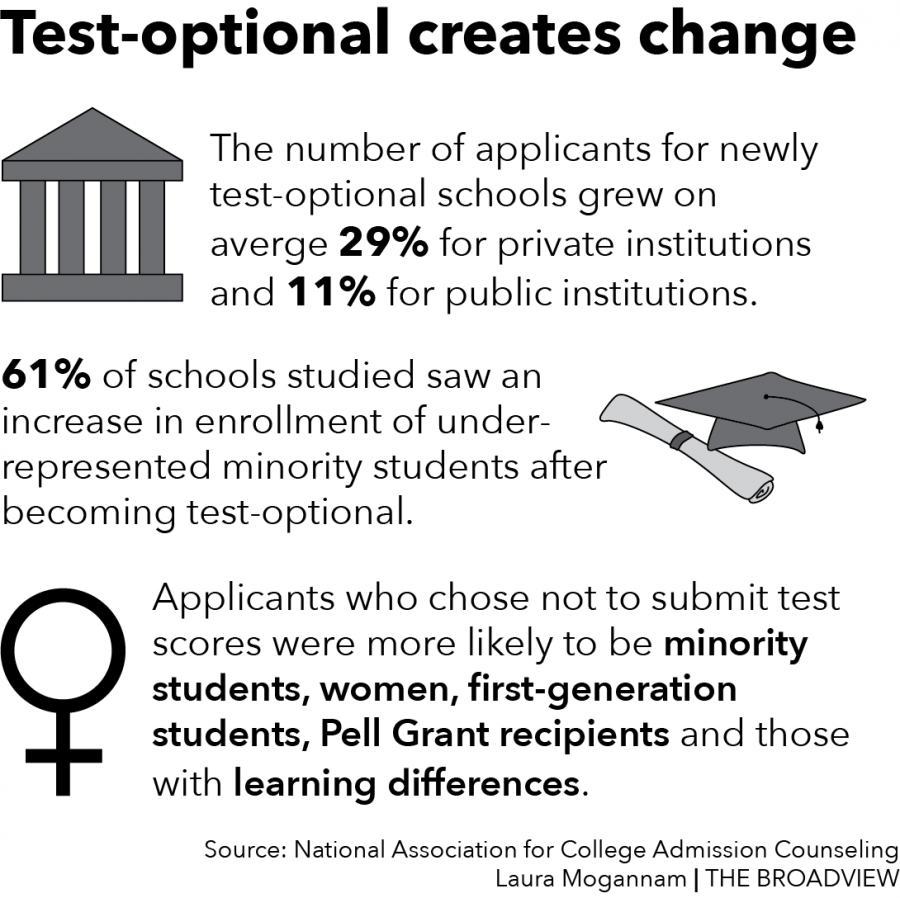Institutions open doors
Optional tests offer more student access to universities, colleges
September 27, 2018
Preparing for and taking standardized tests can cost an applicant’s family hundreds to thousands of dollars and dozens of hours, only for a student to receive a score that an admissions representative might take only a few seconds to look at.
A rising number of major colleges and universities are making the SAT and ACT optional, allowing students to decide whether they want to submit their scores — or even take the test at all.
“A lot of institutions continue to talk more about equity and access when it comes to applying to college,” Troy Carlson, Associate Director of Admissions for the University of Chicago, said. “We understand that a lot of students do not feel best represented by their standardized test score.”
The University of Chicago admission team announced their decision to join the more than 700 test optional institutions this admissions season with its UChicago Empower Initiative in June.
“There are probably a lot of people who do not have the luxury of preparing for such a test,” senior Sydney Marquez said, as she was reading an article about test-optional schools. “Tutors and prep materials are very expensive, and the tests themselves cost a lot of money.”
Some students say that if they can afford to hire a tutor and take the test multiple times, they feel like they are expected to submit scores.
“That is a total myth which I want to dispel,” College Counseling Director Rebecca Munda said. “Colleges truly do not look down upon a student if they do not submit test scores.”
There is no significant difference in cumulative GPA or graduation rates from students who submitted test scores versus those who did not, according to a study released by the National Association for College Admission Counseling.
“I think it is a good move on behalf of the colleges that go test optional,” Marquez said. “Standardized tests are not always an accurate representation of a student’s ability.”
Director of Studies Betsy Pfeiffer says standardized tests are an extra data point on a student’s aptitude on a very specific skill, not a holistic measure factoring in
Students who are unsure about submitting test scores should look at prospective school test averages to see where how they compare with accepted applicants and talk to their college counselor, according to Munda.
“There are several institutions that I am aware of where students can email the admission representative directly, share their test scores with them and ask whether they should or should not submit their scores,” Munda said. “If it is sent via email, it is a counseling moment and they do not use that in the application process.”
Munda says some colleges require applicants to submit a graded paper or write an additional essay if they choose to not submit test scores.
“If a student wants to submit other materials that they feel highlight their skills, they can submit virtually anything,” Carlson said. “It is just another venue for them to put forward work that they are proud of, or that might showcase their talents and abilities.”
Test scores are only a small part of the application, and there are many factors that determine whether a student is admissible, according to Carlson.
“Colleges are always looking for ways to admit students,” Munda said. “Admissions representatives are educators who are just trying to help students find a good fit.”










